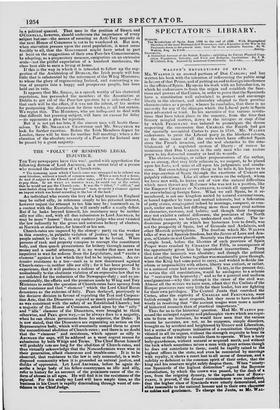THE " FOLLY " OF RESISTING LEGAL INJUSTICE.
THE Tory newspapers have this wee.„-ploted with approbation the following dictum of Lord AHINGER, in a recent trial of a person who resisted the collection of a Church-rate.
" The reasoning upon which Church-rates was attempted to be refused was most frivolous, without a touch of common sense, inen a man took a house, he took it subject to Me Church and other rates, and he was therefore bound to pay them. IF HE WERE AN HONEST MAN, he would say at the outset, that he would not pay the Church-rate. It was the " idlest," " silliest," and most foolish thing ever done by " ignorant" men, to excite a clamour against an impost which was levied according to the law of the laud."
An individual who resists the levy of a legal impost in England may be called silly, in reference simply to his personal interest, however unjust the attempt to tax him may be; inasmuch as, in a contest with the Executive, he will surely suffer a costly defeat. But if he looks beyond himself, his resistance may be neither silly nor idle; and, with all due submission to Lord AHINGER, he may be more" honest" than any embryo judge who ever violated the law indirectly by the gross and notorious bribery of electors, at Norwich or elsewhere, for himself or his son.
Church-rates are imposed by the strong s.:- party on the weaker in this country, in palpable violation of justice; but as long as people submit to the tax, it will continue to be levied. When persons of rank and property conspire to corrupt the constituent body, and then quash prosecutions for bribery through means of money and a useful attorney, it is no wonder that men are too impatient to watt for redress from the Legislature, and "excite a clamour" against a law which they feel to be iniquitous. An ex- iensive resistance to a tax—such as is now threatened against Church-rates--is neither idle nor silly ; for it has been proved by experience, that it will produce a redress of the grievance. It is undoubtedly to the obstinate violation of an onpressive law that we are indebted for the reduction of the Newspaper-duty ; and as un- questionably, the efforts and the promises made by Whig and Tory Ministers to settle the question of Church-rates have sprung from that resistance and that " clamour" which the Lord Chief Baron denounces as the extreme of folly. PEEL declared, previously to the decisive division in favour of repealing the Test and Corpora- tion Acts, that the Dissenters enjoyed as much political influence as was consistent with the safety of an Established Church ; but a majority of the House of Commons, acted upon by the " silly " and "idle" clamour of the Dissenters, were brought to think otherwise, and PEEL gave way,—as he always does to a majority, when he can obtain permission front his superior, the Duke. It is now stated, that the Dissenters are organizing an action on the Representative body, which will eventually compel them to grant the unconditional abolition of Church-rates ; and there is no doubt that the " clamour " and resistance, which appear so silly to ABINGER the sage, will be adduced as a most cogent reason for submission by both Whigs and Tories. The Chief Baron himself will probably vote ere long for the abolition of Church-rates, and thus virtually acknowledge that the Nonconformists were wise in their generation, albeit clamorous and troublesome. It is to be observed, that resistance to the law is only successful, in a well- disposed community when it is grounded on natural justice, and dislike of oppression. Let Lord ABINGER, before he again de- scribe a large body of his fellow-countrymen as idle and silly, refer to history for an account of the proximate cause of the re- form of abuses in all ages. He will find it in the resistance of the injured. For this study my Lord will have ample time, as the business in his Court is rapidly diminishing through want of con- fidence in the ChiefJudge.






















 Previous page
Previous page